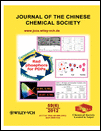
JOURNAL OF THE CHINESE CHEMICAL SOCIETY
Scope & Guideline
Illuminating the Path of Chemical Innovation
Introduction
Aims and Scopes
- Nanomaterials and Nanotechnology:
Research pertaining to the synthesis, characterization, and applications of nanomaterials, including their use in catalysis, drug delivery, and environmental remediation. - Catalysis and Reaction Mechanisms:
Studies exploring catalytic processes, including the design of novel catalysts, their mechanisms, and applications in organic synthesis and environmental chemistry. - Green Chemistry and Sustainability:
Papers focusing on environmentally friendly synthesis methods, waste reduction, and sustainable practices in chemical processes. - Computational Chemistry and Theoretical Studies:
Research utilizing computational methods to predict molecular behavior, optimize chemical reactions, and analyze structural properties. - Analytical Chemistry:
Innovative techniques for the detection and quantification of chemical substances, including sensors, chromatography, and spectroscopy. - Biochemistry and Medicinal Chemistry:
Studies on the chemical basis of biological processes, drug design, and the development of therapeutic agents. - Materials Science and Engineering:
Research on the properties and applications of various materials, particularly in energy storage, conversion, and electronic applications.
Trending and Emerging
- Sustainable and Green Chemistry:
An increasing number of studies are dedicated to sustainable practices, including the development of eco-friendly materials, catalysts, and synthetic methods that minimize environmental impact. - Nanotechnology Applications:
There is a marked rise in research related to nanotechnology, particularly in areas such as drug delivery systems, biosensors, and photocatalytic materials. - Electrochemical Sensors and Energy Storage:
Emerging interest in electrochemical applications for sensing and energy storage solutions, particularly in the context of lithium-ion batteries and supercapacitors. - Biological and Medicinal Applications:
A growing emphasis on the synthesis and evaluation of bioactive compounds, with a focus on their potential therapeutic applications and mechanisms of action. - Computational and Theoretical Approaches:
An increasing trend towards utilizing computational methods to complement experimental research, particularly in predicting reaction mechanisms and material properties. - Interdisciplinary Research:
There is a noticeable trend towards interdisciplinary approaches, combining insights from chemistry, biology, materials science, and engineering to address complex scientific problems.
Declining or Waning
- Traditional Organic Synthesis:
There appears to be a waning interest in conventional organic synthesis methods, with more focus shifting towards greener and more efficient catalytic processes. - Inorganic Coordination Chemistry:
Although still relevant, the frequency of publications dedicated exclusively to classical inorganic coordination compounds has decreased as interdisciplinary approaches gain traction. - Physical Chemistry of Bulk Materials:
Research focusing solely on the physical chemistry of bulk materials has diminished in favor of studies involving nanostructured materials and their unique properties. - Basic Chemical Education:
Publications aimed at basic chemical education and pedagogy have become less common, possibly overshadowed by more advanced topics in chemistry.
Similar Journals

RSC Advances
Connecting Researchers to Transformative IdeasRSC Advances, published by the Royal Society of Chemistry, is a leading open-access journal that has been a prominent platform for cutting-edge research since its inception in 2011. Recognized globally for its rigorous peer-review process, RSC Advances serves the dynamic fields of Chemical Engineering and Chemistry, holding prestigious rankings within the top quartile of academic journals in both areas. With its impact factor reflecting a growing influence, the journal currently occupies the Q1 category in Chemical Engineering and Q2 in Chemistry as of 2023. Researchers and professionals will find RSC Advances an essential resource for innovative studies and applications that advance scientific knowledge. Additionally, as an open access journal since 2017, it affords wider visibility and accessibility to groundbreaking research, fostering collaboration and engagement in the scientific community. Situated in Cambridge, UK, RSC Advances remains committed to its objective of disseminating high-quality research that catalyzes progress across various disciplines.
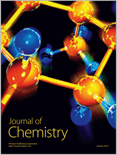
Journal of Chemistry
Connecting Ideas, Driving Discovery in ChemistryJournal of Chemistry, published by Hindawi Ltd, serves as a critical platform for advancing knowledge in the field of chemistry, particularly in its miscellaneous sub-disciplines. With an impressive 2023 Scopus Rank of #123 out of 408 and positioned in the Q2 quartile, this journal exemplifies a robust academic rigor that appeals to researchers, professionals, and students alike. It features articles related to innovative chemical research and developments, catering to a diverse audience eager to contribute to the growing body of literature in the chemical sciences. The journal has been operational from 2013 to 2024, and its Open Access model ensures that findings are easily accessible to a global audience, fostering collaboration and knowledge sharing. With a commitment to quality and relevance, the Journal of Chemistry continues to play a significant role in shaping contemporary chemical research and education.
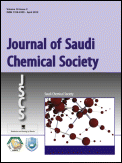
Journal of Saudi Chemical Society
Advancing Chemistry Knowledge, One Article at a Time.The Journal of Saudi Chemical Society, published by ELSEVIER, stands as a premier platform for advancing knowledge in the field of chemistry. Since its inception in 2009, this Open Access journal has garnered significant attention, securing a prestigious Q1 ranking in the Chemistry (miscellaneous) category for 2023, reflecting its position among the top journals in the discipline. With an impressive Scopus ranking of #66 out of 408 in General Chemistry, this journal boasts a commendable 83rd percentile, underscoring its impact and relevance in the global research community. The journal aims to disseminate high-quality research articles, reviews, and case studies, fostering innovation and collaboration among chemists and allied professionals. By enabling widespread access to cutting-edge research, the Journal of Saudi Chemical Society plays a crucial role in supporting the educational and professional development of students, researchers, and practitioners alike, making it an essential resource for anyone invested in the dynamic field of chemistry.

CHEMICAL JOURNAL OF CHINESE UNIVERSITIES-CHINESE
Advancing Chemistry Research, Bridging Ideas.CHEMICAL JOURNAL OF CHINESE UNIVERSITIES-CHINESE, published by Higher Education Press, serves as a vital platform for advancing research in the field of chemistry. With a history dating back to 1996, this journal has evolved to encompass a wide range of topics fundamental to the chemistry community, catering to both applied and theoretical perspectives. Although classified in Quartile 4 within the broader chemistry category, it remains a significant contributor to the knowledge base, ranking 281st out of 408 journals in the general chemistry category according to Scopus. Positioned in Beijing, China, the journal aims to foster collaboration among researchers and professionals while disseminating innovative research and developments. By promoting open exchange of ideas in chemistry, it strives to elevate the scholarly dialogue and contribute to ongoing education for students and professionals alike, with its content accessible through institutional subscriptions.
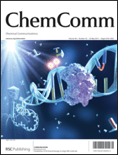
CHEMICAL COMMUNICATIONS
Fostering collaboration in the world of materials science.Chemical Communications, published by the esteemed Royal Society of Chemistry, is a prominent journal within the field of chemical science, focusing on the dissemination of cutting-edge research in a variety of sub-disciplines including catalysis, materials chemistry, and electronic materials. Operating without an open access model, this journal provides critical insights from contributors around the globe, enhancing our understanding of complex chemical interactions and innovative applications. Ranked in the top quartile for several categories such as Ceramics and Composites, and Metals and Alloys, Chemical Communications boasts impressive Scopus rankings, securing strong positions across multiple fields and showcasing its influence within the scientific community. The journal is committed to advancing knowledge and fostering collaboration among researchers, professionals, and students, making it an invaluable resource for those looking to stay abreast of the latest advancements in chemistry and materials science. With a publication history dating back to 1965 and continuing into 2024, its rich archive serves as a vital repository of chemical research and development.
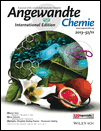
ANGEWANDTE CHEMIE-INTERNATIONAL EDITION
Cutting-edge Insights into Catalysis and ChemistryANGEWANDTE CHEMIE-INTERNATIONAL EDITION, published by WILEY-V C H VERLAG GMBH, stands as a leading journal in the fields of Chemistry and Catalysis, holding a prestigious position with a Q1 ranking in both categories as of 2023. With an ISSN of 1433-7851 and an E-ISSN of 1521-3773, this esteemed publication has been an invaluable resource for the global scientific community since its inception in 1962. The journal's impact is further underscored by its remarkable Scopus rankings, where it occupies the 13th place among 408 journals in General Chemistry and the 4th place among 68 in Chemical Engineering - Catalysis, marking it in the 96th and 94th percentiles, respectively. Although it does not offer Open Access, ANEWANDTE CHEMIE-INTERNATIONAL EDITION remains essential for researchers, professionals, and students seeking to stay abreast of cutting-edge developments and innovations in chemical sciences. Its comprehensive scope and rigorous peer-review process ensure that only the highest quality research finds its way to publication, contributing significantly to the advancement of chemistry worldwide.
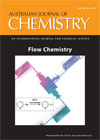
AUSTRALIAN JOURNAL OF CHEMISTRY
Advancing chemical knowledge, one article at a time.The Australian Journal of Chemistry, with an ISSN of 0004-9425 and an E-ISSN of 1445-0038, is a distinguished publication from CSIRO PUBLISHING, dedicated to advancing the field of chemistry since its inception in 1948. Based in Australia, this journal serves as a platform for original research articles, reviews, and innovative studies that encompass a wide spectrum of chemical disciplines, aiming to foster communication and collaboration among researchers globally. Despite its Q3 ranking in the Chemistry (Miscellaneous) category and standing at rank #236 in Scopus’ general chemistry classification, it remains an essential resource for professionals and students seeking to stay informed about emerging trends and discoveries in chemistry. The journal does not offer open access, emphasizing the premium quality of peer-reviewed content that adheres to rigorous academic standards. By bridging theory and practice, the Australian Journal of Chemistry continues to play a crucial role in shaping the future of chemical sciences.
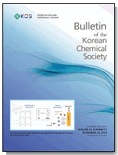
BULLETIN OF THE KOREAN CHEMICAL SOCIETY
Fostering excellence in diverse chemical research.BULLETIN OF THE KOREAN CHEMICAL SOCIETY, published by WILEY-V C H VERLAG GMBH, is a prominent journal in the field of chemistry, with a specific emphasis on miscellaneous chemical research. With an ISSN of 0253-2964 and E-ISSN 1229-5949, this journal serves as a pivotal platform for researchers, professionals, and students who are eager to showcase innovative studies that address both foundational and emerging topics in the discipline. Boasting a commendable Q2 ranking in the 2023 chemistry quartiles, the journal ranks within the top 50th percentile in Scopus, reflecting its commitment to high-quality scientific discourse. The content published within its pages from 1996 to 2024 covers a vast array of subjects, ensuring a multidisciplinary approach to chemical research. The journal’s impact in the academic community is underscored by its accessibility to a global audience, making it an essential resource for those wishing to stay at the forefront of chemical advancements.
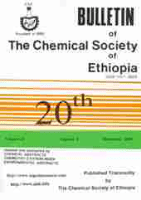
BULLETIN OF THE CHEMICAL SOCIETY OF ETHIOPIA
Elevating Chemical Research to New HeightsBULLETIN OF THE CHEMICAL SOCIETY OF ETHIOPIA (ISSN: 1011-3924; E-ISSN: 1726-801X), published by the Chemical Society of Ethiopia, serves as a pivotal platform for the dissemination of innovative research and developments within the field of chemistry. Since its inception in 1996 and now an open access journal since 2012, it has provided researchers, academics, and students with unrestricted access to critical studies and findings, thus fostering collaboration and the advancement of knowledge in the discipline. The journal's current standing in the Q3 quartile in the 2023 Chemistry category underlines its commitment to maintaining high academic standards, while its Scopus ranking, positioned at #250 out of 408 in general chemistry, showcases its growing influence and contribution to the scientific community. Hailing from Ethiopia and targeted toward a global readership, the journal aims to highlight local and international research, engaging scholars and practitioners alike in discussions that propel the science of chemistry forward.

Eurasian Journal of Chemistry
Exploring Innovative Horizons in ChemistryEurasian Journal of Chemistry is an emerging open-access journal published by KARAGANDA STATE UNIVERSITY in Kazakhstan. With a focus on the diverse and dynamic field of chemistry, this journal aims to disseminate cutting-edge research and innovative findings from various branches of chemistry, engaging a global audience of researchers, professionals, and students. Despite its recent inception in 2023, the journal is strategically positioned within the field, currently ranked in the fourth quartile of Scopus for General Chemistry, indicating its potential for growth and contribution to the scientific community. The ISSN of the journal is 2959-0663 with an electronic counterpart of 2959-0671, ensuring wide accessibility to its rich content. With an open-access model, the Eurasian Journal of Chemistry promotes the sharing of knowledge and advances in research to foster collaboration and inspiration across the globe.